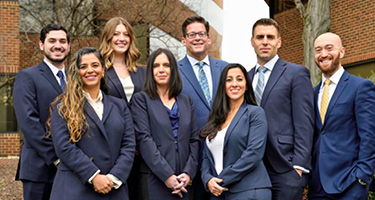A new Texas family law could see paralegals practicing in the state alongside formally licensed lawyers, providing many of the same services.
The newly proposed legal program, awaiting final approval from the state’s Supreme Court, could soon authorize paralegals and other legal paraprofessionals to provide licensed legal services and counsel to low-income individuals.
The initiative focuses on practice areas including family law, estate planning, probate and consumer debt, aiming to expand access to affordable legal support.
Justices said they hope that giving paralegals and other paraprofessionals the right to practice will help close the “justice gap” in the state, and further address many unmet civil legal challenges.
As per the proposal, both a lack of government resources and staffing constraints have contributed to extending the gap in legal services, preventing practicing attorneys, legal aids and volunteer organizations from best serving local Texas communities that fully qualify for said assistance.
"Ensuring that people, regardless of their economic standing, have access to civil legal services is fundamental to the integrity of our judicial system," said Texas Supreme Court Chief Justice Nathan Hecht in a recent statement.
How Legal Deserts Threaten Families
With only a few major urban hubs dispersed across a vast expanse of rural communities, Texas is a hotbed for legal deserts.
Similar to Maine’s recent struggle with a lack of resources and legal representation shortages that spurred a nationwide ACLU response and class action lawsuit, legal deserts continue to persist in Texas, disproportionately affecting family legal services and children in particular.
A legal desert is any rural or remote setting with a severe lack of legal services, representation and resources.
This scarcity of resources leads to many intrastate challenges for legal professionals and residents currently seeking legal assistance for issues ranging from complex family law matters to property disputes.
Legal deserts have created a profound shortage of attorneys and legal aids available for juvenile or other family court proceedings.
This is often due to a limited number of available programs and certifications necessary to prepare attorneys with the skill set needed to best serve vulnerable communities in need.
Making a Bad Problem Even Worse
Rural communities, which typically face the brunt of these legal challenges, struggle to access the legal representation they deserve, giving way to the formation of so-called legal deserts.
According to a 2020 report conducted by the American Bar Association, approximately 1,300 counties throughout the United States have less than 1 attorney or legal professional per every 1,000 residents.
In some instances, legal aid is virtually non-existent for individuals, requiring them to resort to legal resources outside of their immediate community and putting undue strain on struggling families.
Legal deserts in Texas often deal with family legal issues such as custody determination, divorce, juvenile court cases and child welfare proceedings, making the need for governmental response and the formation of a non-lawyer paralegal program even more dire.
Closing the Justice Gap Isn’t Easy
Texas is far from the first state to propose that paralegals and other paraprofessionals be utilized to fill the gaps in aid and provide legal assistance to quell the growing strain on specific judicial systems.
But while Texas appears poised to move forward with its new law, not all states have been as successful pushing through likeminded laws. Similar efforts have been halted in several other states, namely in California and Washington.
In 2022, the California State Legislature failed to successfully launch a “legal sandbox” program comprised of paralegals and yet-to-be-licensed legal professionals. The initial goal was to experiment with attorney deregulation and allow highly trained non-lawyer types to offer their legal services throughout the state.
State assemblymembers and fellow supporters of this dramatic legal shift, who co-sponsored the bill’s passage, stated that lawmakers remained wary of such a change and expressed their concerns about the severe lapse it would cause to the state’s bar attorney discipline system.
The legislation was eventually overturned, with critics of the bill stating that restricting this “legal sandbox” and the function of legal paraprofessional initiatives would help the bar centralize its focus and return to its core mission of “protecting the public.”
Having Second Thoughts
While Washington offered paraprofessionals licenses and the ability to represent underserved communities for years, the Supreme Court decided to end the state’s non-lawyer programs in 2020.
Initially launched in 2012, the Limited License Legal Technicians (LLLT) program was created to “respond to unmet legal needs of Washington residents who could not afford to hire a lawyer” by allowing unlicensed paralegals, paraprofessionals and legal adjacent technicians to provide limited legal services to clients dealing with family law related matters.
Before the service was discontinued, paralegals and other paraprofessionals trained in the family law space practiced law on a limited license.
Ultimately, Washington’s Supreme Court determined that the LLLT program was ineffective in meeting the needs of underserved or disadvantaged communities seeking legal representation, support or advice.
Of course, not every state has failed to advance family law reform or reversed course.
Texas’ new law looks to join an exclusive yet steadily growing group of other states, including Colorado, Oregon, Arizona and Minnesota, who have established legal programs to license some trained non-lawyer professionals to provide limited legal services.
A New Chapter
Despite the setbacks experienced by other states, the new law in Texas represents a renewed and revitalized dedication to granting paralegals, paraprofessionals and other non-lawyers with the training and licensing required to adequately assist underserved and underrepresented communities.
Through harnessing the potential of paralegals and paraprofessionals to take on a wider range of legal responsibilities, the state has a unique opportunity to directly improve how easily low-income families and rural populations access justice.
By acknowledging the instrumental role non-lawyers and other legal professionals can play, the proposed program could help resolve pending family law-based matters in addition to any other pressing legal issues left on the back burner.
Untapped Resources
This bold step to license, train and equip qualified paralegals and paraprofessionals with the skills they need, which has been met by much criticism in other states, may be reflective of a much broader legal shift within the U.S. judicial system.
The proposed move not only recognizes the innate value of this underutilized workforce of paralegals but also seeks to address these longstanding inequalities and challenges in legal services through innovation.
Both regulatory adjustments and legal licensing frameworks for paralegals and other paraprofessionals will need to be carefully reviewed, with the outcome likely initiating a critical difference in narrowing the sizeable justice gap.
By introducing this new law, Texas has the potential to empower paraprofessionals and demonstrate how other states can reinvent their legal systems through alternative service models.
The Path Forward
The Texas Supreme Court is no longer fielding public comments on the proposed bill and amended rules for licensed paraprofessionals and court-access assistants. Without any future legislative setbacks, the bill is expected to go into full effect on Dec. 1, drastically reshaping the legal response to the state’s growing aid gap.
Texas currently stands at a critical turning point in addressing longstanding legal challenges and inequities plaguing the family law practice area and many other categories of state law.
By allowing non-lawyers, including paralegals, paraprofessionals or other legally adjacent specialists, to gain additional training, the state can offer underrepresented individuals, families and entire communities an innovative option to meet their specific legal needs.
Despite the potential threat of impending challenges and setbacks in the coming months, the list of benefits for Texans who require legal aid makes this development worth the Supreme Court’s full attention.
When all is said and done, this bold legislation could mark the next step forward in closing the justice gap, and a brighter legal future for non-lawyers operating throughout the state.
































